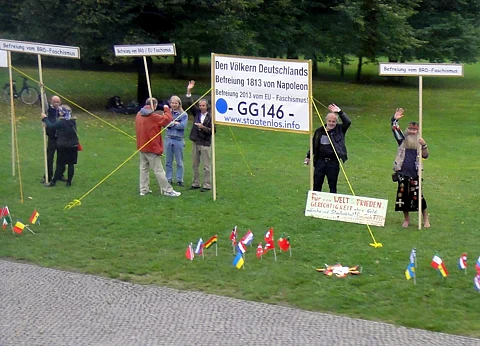

German authorities have banned the far-right group "Kingdom of Germany," a self-styled separatist organization that rejects the legitimacy of the Federal Republic and seeks to establish an alternative state. The ban, announced Tuesday by Interior Minister Alexander Dobrindt, coincided with nationwide police raids across seven states and the arrest of four individuals, including the group’s founder, Peter Fitzek.
"This organization has created a counter-state in our country and built up criminal economic structures," Dobrindt said. "They persistently undermine the rule of law and use antisemitic conspiracy narratives to justify their claims to power."
The “Kingdom of Germany,” or Königreich Deutschland, is part of the broader Reichsbürger (Reich Citizens) movement, which denies the legitimacy of the modern German state. Founded by Fitzek in 2012, the group has established its own constitution, currency, and governance structure on a hectare of land near Wittenberg, eastern Germany. Authorities estimate it has around 6,000 followers.
Fitzek, a 49-year-old former chef, has long been on the radar of law enforcement. In 2017, he was convicted of embezzlement and illegal banking, although the ruling was overturned a year later. In 2022, Germany's domestic intelligence agency, the Federal Office for the Protection of the Constitution (BfV), classified the organization as extremist.
Dobrindt emphasized that the ban extends to affiliated splinter groups, aiming to dismantle the group’s influence entirely. The raids took place in Baden-Württemberg, Lower Saxony, North Rhine-Westphalia, Rhineland-Palatinate, Saxony, Saxony-Anhalt, and Thuringia.
The ban comes amid growing public debate about how to address the rise of the far-right in Germany. Earlier this month, the BfV labeled the Alternative for Germany (AfD) party a "right-wing extremist" organization, enabling increased surveillance. The AfD, which received over 20% of the vote in February's federal election, is the second-largest group in the Bundestag.
While more than half of Germans—53% according to polling firm Insa—support banning the AfD, Chancellor Friedrich Merz's conservative government has resisted such a move. Dobrindt, a member of Bavaria’s Christian Social Union (CSU), argued that political engagement is a more effective response than prohibition.
“I am convinced that the AfD does not need to be banned,” he said. “We must address the issues that have made the AfD so big.”
The Reichsbürger movement gained heightened scrutiny after a 2022 foiled plot to overthrow the government. The conspiracy involved plans to raid parliament and install an interim regime. Authorities charged 27 individuals and seized over 380 firearms, leading to three major terrorism trials that began in April 2024.
Security services continue to monitor extremist activity closely, viewing the movement as a significant threat to democratic stability.